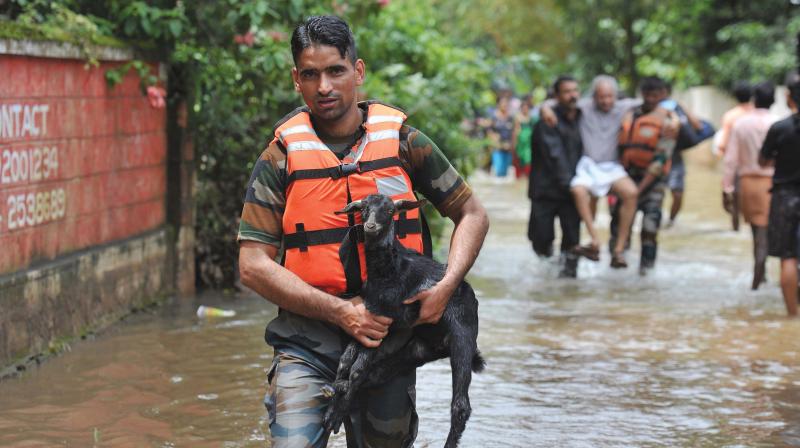A flood of divisiveness
The aftermath of the floods has stirred many debates on its causes, and some are downright communal and ludicrous in nature.

The floods that hit Kerala earlier this month grabbed the attention of people around the globe. Not only did it stir a debate about the cause, whether man-made or human, it has trickled of many insensitive, irrelevant and racial comments. While a few empathise and seek measures to repair the damage, a few others have turned the disaster into a religious and communal issue.
Several comments pointing fingers at the eating habits and religious practices of the state, ridiculous as they may be, are being touted as the reason for the devastating floods, and have gone viral on Twitter, Instagram and Facebook.
Responding to a tweet by Manikandan S, Prithvi Chandavarkar, a professor at Jain University, shakes his head with repugnance, “There is a lot of fake news being circulated currently. One that I recall demands that only people belonging to certain communities should receive the required help, and the others should be ignored. Certain political parties have been trying to create religious and political rifts between people; taking advantage of the situation for their own benefits. By using the medium of fake news, they are spreading communal disharmony and segregating people.”
After receiving unusually heavy rainfall on the evening of August 8, Kerala was ravaged with severe flooding, forcing almost all dams to be opened. People from India and abroad were motivated to donate in any way possible (be it monetary or through supplies of food, water or clothing) through social media apps. A few responses to these posts prompted people to not help the state owing to the racial slurs.
Leslin KS, a student of Jain University, who hails from Kerala feels it is important to stay with the affected people, and not drift away.
He says, “People of all religions co-exist here, they don’t look at others through a communal lens. The recent posts about the Kerala floods being the result of Lord Ayyappa’s wrath due to women demanding entry to the Shrine in Sabarimala or the due to the fact that Kerala consumes beef, shows the rudimentary and divisive thinking at play. It shows how some people can’t think beyond the boundaries of caste, religion or politics.”
Seher Dareen, a freelance content editor with StudyMode, says, “These posts only show how prejudiced people are. It amuses me to see that people are drawing a connection between eating habits and the flood, two irrelevant and totally unrelated subjects. It highlights the saffronisation taking place in India. Kerala has been a place that’s been well-rooted in morals and humanity. There is no reason why one should turn a blind eye to their struggles or discriminate in the name of caste, religion or traditions in such severe conditions.”
Belittling the insensitive comments of these netizens, Dr Sudeshna Mukherjee, co-ordinator of Centre for Women’s Studies, Bangalore University, laughs dryly in response to why such comments surfaced in the first place, “Isn’t it funny that Lord Ayyappa showed his wrath only when women tried entering his temple, and not when they were raped or abused? It shows the misogynist mentality of the people who are willing to use distress in their favour. Also, do keep in mind that the 2019 elections are around the corner, and people are managing their own vote bank and eyeing for political stands. I fail to understand how people can be so irresponsible. By discussing or fuming against these comments, we are only making it worse. They should be ignored. The things we should be discussing currently are rehabilitation, course correction and relief,” the doctor concludes.

